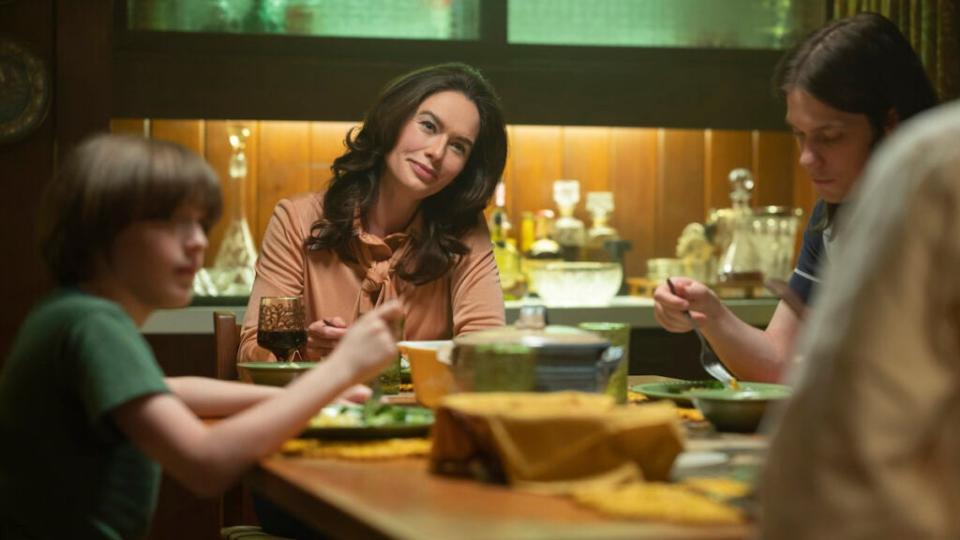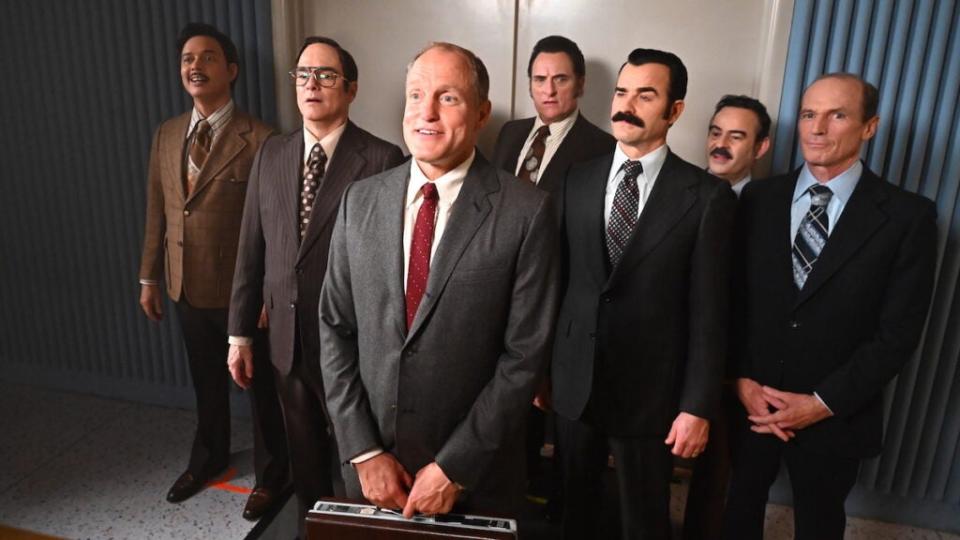‘White House Plumbers’ Review: HBO Limited Series Is as Sloppy as the Watergate Break-in
The legacy of the Watergate break-in is one of virulent distrust in the American government, and in some cases aggressive empowerment of shady tactics from the American government. Our media has been enraptured with the story for decades, as an example of how head-and-shoulders-down journalism work can take down the tyrannical powers that be, from Alan J. Paluka’s “All the President’s Men” to Ron Howard’s “Frost/Nixon.”
But now, Hollywood has shifted to depictions from within the Watergate scandal. Just one year after the limited series “Gaslit,” we have a new five-episode limited series entitled “White House Plumbers.” And the results are sloppy, much like the actual Watergate break-in.
The primary White House Plumbers — the special investigation unit tasked to “plug leaks” emitting from the White House and protect President Richard Nixon’s power by any means necessary — are the gruff E. Howard Hunt (Woody Harrelson) and the theatrical G. Gordon Liddy (Justin Theroux). With a ragtag group of bumbling would-be spies (an ensemble cast including Rich Sommer, Yul Vazquez and Nelson Ascencio), and a more buttoned up group of bumbling would-be government officials (including Domhnall Gleeson, Ike Barinholtz, and John Carroll Lynch), the Plumbers engage in myriad matters of criminal activity. The action culminates in the harried, raucous break-in to the Watergate Hotel, the site of the Democratic National Convention, for the purpose of stealing information.
Also Read:
TV Premiere Dates 2023: New and Returning Shows
As the players grapple with secrets, allies and an ever-tightening criminal investigation, Howard also struggles with his split loyalties between his beloved right-wing government and his family in need (including Lena Headey as his wife Dorothy, Kiernan Shipka as his daughter Kevan and Liam James as his son Saint).
The core behind-the-camera creative team — writer/creators Alex Gregory and Peter Huyck, and director David Mandel — worked together on HBO’s incendiary political comedy “Veep.” It’s clear this trio wants to mimic Armando Iannucci’s voice, injecting the miniseries with constant contempt, ironic distance and profanity-laden insults. But the miniseries cannot consistently convey this tone, formally pull off the razor sharp edits that gave “Veep” its punch, nor fill up the hour long episodes centered around it.
Thus, hints of other influences are mildly evoked, from Steven Soderbergh to Adam McKay to Jay Roach, to what we might call a shallow understanding of 1970s genre filmmaking techniques. These obviously peddled touchstones never coalesce and only remind the viewer of their superiority — and that’s before the series lurches in and out of maudlin family melodrama, unconvincingly centering Howard’s emotional arc around the struggles of balancing work and family; a creative decision that’s hard to get behind when the rest of the series seems determined to chastise these characters, not empathize with them.

Asked to stabilize this wobbly tightrope, the cast generally turns in competent, if uncared for work. Headey’s role is underwritten in the first chunk and overwritten in the final, but what the performer turns in is sturdy. Vazquez’s eyes emanate emotion and understanding no matter the ridiculous situations he finds himself in, elevating his scenes instantly. And longstanding MVP Judy Greer is reliably hilarious as Gordon’s long-suffering housewife, who cheerily subjugates herself to the patriarchal whims of her husband with savage, smart commitment.
Unfortunately, Harrelson’s central performance as Howard flattens any momentum gained by his scene partners. It’s a one-note, gravel-throated, exaggerated piece of acting that cannot find footing in the series’ admittedly shifting tone, a stubborn miscalculation that never improves.
On the other hand, Harrelson’s partner in crime turns in some of the best work of his career. Theroux has been adept in drama (“The Leftovers”) and comedy (this delirious award season roundtable satire) alike; with Gordon, he exemplifies his strengths on both sides simultaneously. Boasting a thick mustache, affected European accent and ego-driven shows of masculinity, Theroux attacks the role broadly, unafraid to appear ridiculous, to push the edges of contemporary comedy screen acting past its usual boundaries of verisimilitude. Yet there’s a quiet versatility in Theroux’s work — at multiple times during the series, Gordon abruptly pulls out a gun, and each time Theroux understands both the comedic and emotional truth in the decision, differentiating them impressively. It’s a layered work of staggering hilarity, an obviously centering performance that, at times, manages to lasso the varied, inconsistent tones and script decisions together and make it all feel intentional.

But by the end of Episode 5, which ends with those requisite “what happened next” chyrons you’ll see in any docudrama, any sense of purpose has long since dissipated. Which leads us to a final question when engaging with this material: What are we to learn from this interpretation of this particular moment in history? Is it that our government will abandon us for an iota more unit of power? That one’s individual sense of safety trumps collective loyalty? That “family is the most important job of all”?!
It’s all of these well-trodden morals at once, making it none of them. It’s the indication of a sputtering, untuned storytelling engine, too comfortable to coast in the wakes of others’ voices without realizing they’re charting a course for several different oceans at once. At least G. Gordon Liddy had a single-minded mission.
“White House Plumbers” premieres Monday, May 1, on HBO.

 Yahoo News
Yahoo News 
